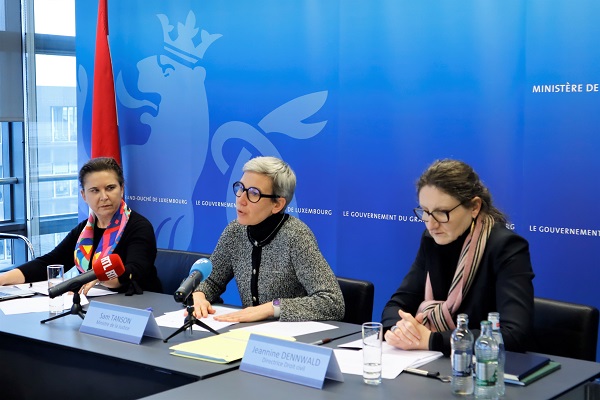 L-R: Elisabeth Kampa, Ministry of Justice; Sam Tanson, Minister of Justice; Jeannine Dennewald, civil law director;
Credit: MJ
L-R: Elisabeth Kampa, Ministry of Justice; Sam Tanson, Minister of Justice; Jeannine Dennewald, civil law director;
Credit: MJ
Luxembourg's Minister of Justice, Sam Tanson, recently introduced the "Future Protection Mandate" (mandat de protection future) bill, relating to the legal arrangements for incapacity.
This conventional measure of legal protection allows any adult to anticipate and organise their own protection in advance by designating one or more individuals to represent them in acts of civil life, in the event that they are no longer capable of doing so due to an alteration of their personal faculties preventing the expression of their will. This extrajudicial measure does not require the intervention of a judge for its implementation and its execution and is established on the principle of autonomy of will.
The person in question can anticipate and organise the specific and personalised framework of their future protection themselves. They may freely choose the designation of their mandatary and the objective of the future protection mandate, which is left to the individual initiative of the person. They are free to define the scope of the mission, the rights and duties entrusted to the designated individual as well as their limits. This is a representation regime, allowing the person to maintain their legal capacity during the execution of the future protection mandate.
According to the Ministry of Justice, the new system guarantees that respect for the will of the person is protected: the guardianship judge is required to respect the content of the future protection mandate and can only complete it or open a judicial protection measure if the interest of the protected individual requires it. The future protection mandate can thus avoid, if not delay, the opening of curatorship or tutorship.
The ministry recalled that this instrument implements an element of the 2018-2023 coalition agreement, respectively a specific action foreseen in the second national action plan for the implementation of the Convention on the Rights of Persons with Disabilities 2019-2024. The future protection mandate also prepares the ground for the future ratification of the Hague Protection of Adults Convention of 13 January 2000. The ministry added that it is part of an active public policy that takes into account the aging of the population and the risks of loss of autonomy.








